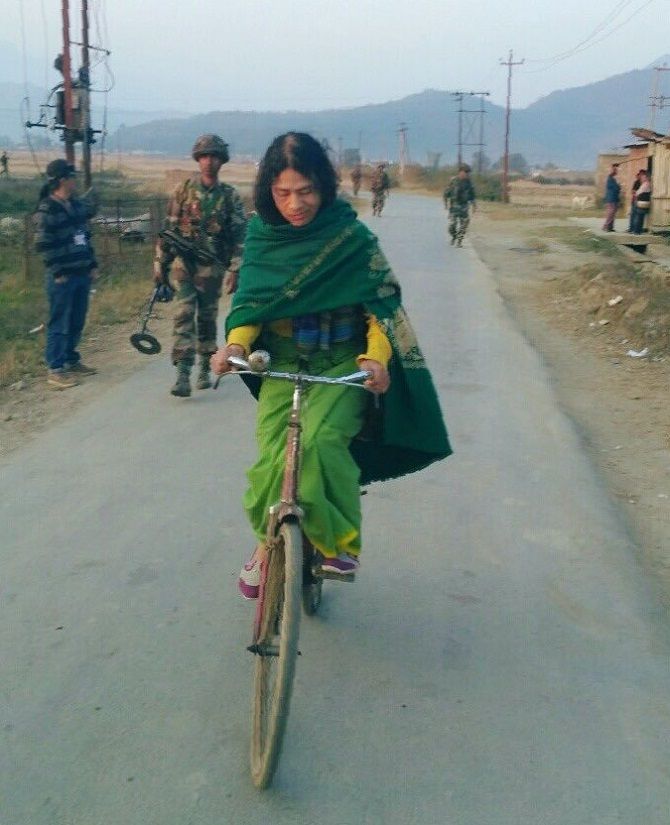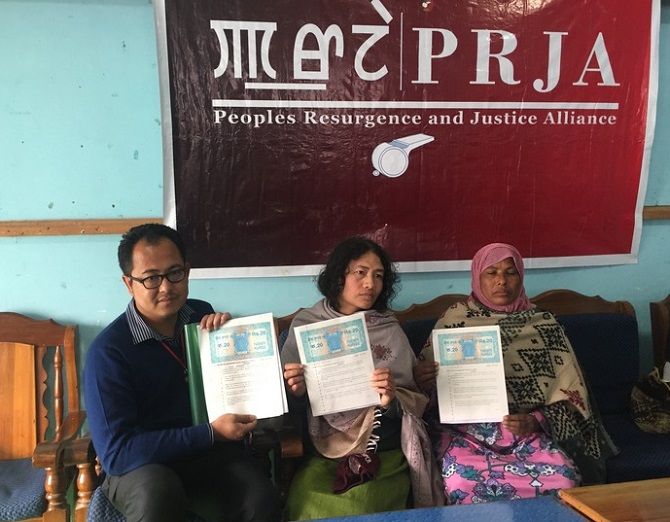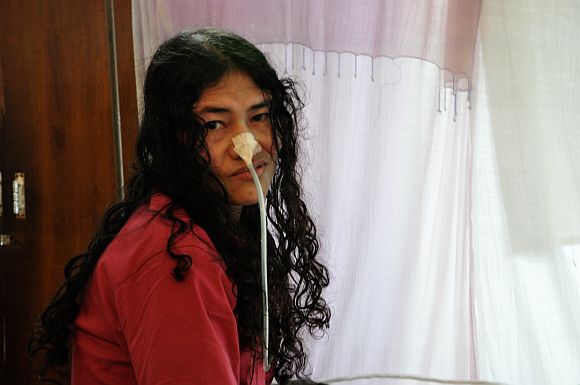Deepti Priya Mehrotra, who documented Irom Sharmila's struggle for peace in Manipur in the book Burning Bright, puts the icon's electoral loss in perspective.

No matter how quixotic Irom Sharmila's decision to contest elections appeared, no one had anticipated the shocking results.
The activist who had been on a hunger strike for 16 years to demand the repeal of the Armed Forces Special Powers Act from Manipur and had become the face of the movement for the world won just 90 votes.
The 'None of the Above' option got 143 votes.
Her main opponent in the Thoubal constituency, incumbent Chief Minister Okram Ibobi Singh of the Congress, won comfortably with 18,649 votes.
Though Irom Sharmila has said that she will quit politics after this loss, the people who know her best believe that neither is this, in any way, a reflection of the love the people of Manipur have for her and nor is it the end of her story.
In conversation with Rediff.com's Monali Sarkar, Deepti Priya Mehrotra, the author of Burning Bright: Irom Sharmila and the Struggle for Peace in Manipur, discusses what we are unable to see from the outside.
Most people expected that Irom Sharmila would lose the elections. What about you?
I did not expect her to win, because it (electoral politics) is a different ballgame all together. And I don't think the point of her standing was that she would win.
Why do you suspect the votes for so few?
The entire situation in Manipur is not just complex, but extremely disturbed.
Every person in that state really wants to live in peace. And even before that perhaps -- or along with that -- have basic amenities, essential items at a reasonable price, which has not been happening.
The point that the electorate is really looking at is who will deliver those goods.
Irom Sharmila is somebody people greatly respect and love.
Women, men, young, old. Across the state, definitely throughout the valley, through much of the Naga areas, probably the Kuki areas.
So, by this performance, I wouldn't evaluate her standing in a sense with the people.
I think it is a question of realpolitik. In the sense that the people are looking for a party that knows how to run the state.
That is not to say just administrative and governing abilities, but being able to manipulate various things, being able to get the money from the center, use it.
It's an extremely corrupt system. The money that is earmarked for the northeast, for Manipur doesn't really reach the people it is earmarked for.
It might reach the northeast, but it is not reaching the people.
I think it is a desperate kind of situation. People are really desperate. I think it is the worst governed state in the country.
I wouldn't think it (losing the elections) makes much difference. Everybody knew she would lose. She knew she would lose, I should think.
The point of her standing is that there is a different voice still alive, which is saying that can we have clean politics.
This voice will not win immediately.
I think the test will be if the party (People's Resurgence and Justice Alliance) can stand despite this setback. And there has to perhaps be an alternative way along with this to keep the movement alive in a sense.
This was experimental. This is not the end of the story for Irom Sharmila. This is not what she is about.
The PRJA tweeted, 'We have lost a battle in the long war, but we have started the fire, initiated a movement which will continue.'
However, the desperately low number of votes awarded to the woman who has been the face of the campaign to lift AFSPA is significant.
What does it mean for the campaign?
The campaign is far broader, and, to my mind, the connect is not so direct.
For the world, Irom Sharmila is the face of the anti-AFSPA movement, but for anybody closer to Manipur and for the people of Manipur, she is one of the players.
There are other equally important players.
Those who are working at the legal front, at the Supreme Court, are extremely important.
Also, the human rights groups across Meiteis, Nagas etc to the Meira Paibis.
The women's movement (in Manipur) has predated Irom Sharmila. It has been there since the 1950s, 1960s. In the 1970s, it was against army atrocities.
And 1980 onwards -- ever since AFSPA was imposed (throughout the state of Manipur) -- it has been anti-AFSPA.
In 1980, Irom Sharmila was eight years old, but there were ladies who were out there, struggling, building the movement against AFSPA.
And there is a third group of people, which is the students groups, the youth...
Sharmila is only one of the players.
The movement is on. The legal struggle at the Supreme Court is the most important thing at one level.
The Supreme Court has ruled that there have been extra-judicial killings, and is continuing to probe more than 1,500 killings. It is a pathbreaking judgment.
These are being fought not by Irom Sharmila, but by others.
Irom Sharmila is very supportive of them, but what she has been doing is one arm of the movement.
She decided to try (an electoral path), she decided to experiment with governance and that was not what the movement people decided.
She is part of the movement, but it wasn't the movement as a whole that took that decision. So, the movement continues.
Yes, the wider world -- I think because of the dramatic nature and the power of an individual that she represented -- is more aware of her struggle than of the other arms.
There is an unfortunate disconnect there in terms of communication to the rest of the world. But at the local level the movement continues and she is part of it.
The Meira Paibis have clearly said over the decades that they have a policy, a strategy that they don't believe in joining electoral politics.
They disassociated from this particular thing... But you will find Meira Paibis ladies around her on so many occasions.
When she gave up her fast I went there immediately and stayed in hospital with her for a bit.
Everybody from every section of society, including Meira Paibis and human rights groups, were all around, hugely supportive of her giving up the fast.
It was misrepresented in the media as people are against her giving up the fast... (Yes) there was a question mark, but there was also a strong sense that people had that why should she be sacrificing herself.
The local level is very different from how the rest of the world has interpreted Manipur... I don't think the movement is really going to be affected because movements have a different logic and they carry on.
It did seem that her election campaign was a lonely battle though...
I was not there myself, but what I gathered from talking to people and reading those who have been there was the way she, Erendo Leichombam and Najma Bibi battled, the door-to-door campaigning was the best part of it for her. People are so, so warm towards her.
I don't see her as being isolated beyond a point.
But there is a lot to be thought about in terms of doing something active and meaningful on the ground, and this was clear the moment she gave up her fast.
I think she is still at an experimental stage in figuring out how can she do something really meaningful.
This has obviously flopped in terms of becoming an elected representative of the people... She has said earlier that it is not about winning or losing this election, but it does reflect something.
One can't say it reflects nothing. What it reflects is people don't see her as a person who can bring the goods at the policy level.
I have to say that the moment she said this I had huge question marks about her standing for elections, and I said as much to her.
That's how most people who are close to her -- which is much of Manipur -- feel.
They are still with her, they love her dearly, but they have question marks about her as a figure in government circles.
There has to be pragmatism...
Yes! Look at Manipur politics over the decades. Except for recent past, they have always elected a party to power which is the party at the Centre.
Given this context, instead of taking on the incumbent CM, had Irom Sharmila taken a more pragmatic approach of fighting from a constituency with a weaker candidate, do you think she would have had a fighting chance at a win?
Better maybe (in terms of) a little more votes, but she needs to relook at the whole strategy of standing for elections.
She needs to align with the strategy of the Meira Paibis, the human rights groups. Personally, I think that's the best way for her to go -- to align more closely with the rest of the movement.
I haven't had a chance to talk to her, but I think she would be reassessing right now.

What is Irom Sharmila's relationship with hope?
That question takes one deeper into her 16 years of extraordinary, remarkable and unparalleled struggle because who would do that if they weren't basically full of hope about humanity.
She has every right to just move away from the arena. Go live somewhere else, marry, whatever she likes. She could do that, but she is not doing that.
She is determined to carry on with the anti-AFSPA movement and all that it means.
She, her brother who has been her supporter ever since I have known them, her family, other Manipuri activists that I know and deeply respect -- (in them) there is a sense of tremendous kind of optimism underlying this fight.
They have always managed to forge ahead (even though up till now) they have failed to get AFSPA removed.
Globally, these are cutting edge protests. There has been nothing like the nude protests (by mothers in 2004).
There has been nothing like a 16-year hunger strike anywhere ever in the world.
They are up against something so immovable it seems like, but they are not going to give up because it is a matter of basic survival -- physically as well as the identity of the people.
They have got tremendous cultural and emotional resources. There is very strong solidarity between the people, which, I think, the rest of the world totally misunderstands when they think she is isolated.
You have known Irom Sharmila very well since 2006. At this point, what are your thoughts on her journey?
I don't see this (her electoral loss) as a huge thing actually. I saw the huger thing as her giving up her fast (in August 2016).
She knows that what she is trying to do with electoral politics is experimental...
I think she has enjoyed and learnt a lot in the seven months (since giving up her fast).
I think what she has been doing is coming out of her isolation -- from being physically isolated (there was a blanket ban on visitors to Irom Sharmila when she was under arrest) -- and moving about amongst the people.
I think that's what she needed to do. This has provided her a rationale to do that.
She has gone door-to-door. She has been very warmly received. They were very warm and happy with her; they were just not convinced that she was the candidate for the post.
I think what is important and interesting also is the new methods PRJA tried to introduce into the electoral arena.
They put out boxes saying donation not more than ₹10. Which party would have that imagination? They have brought in a new kind of imagination into this arena.
Also these three (including Irom Sharmila) are incredible figures. Najma is the first Muslim woman candidate in entire Manipur history, and Erendo is a very different figure, who has studied in Harvard and come back.
This is a non-corrupt party. This is a party which really believes in diversity and women's rights.
Nobody can doubt that they believe in getting over the violence and fighting for justice.
It will be good if they can keep the party going... or become a forum or think of some other form -- whether they stand for elections or they don't, but they are there in the public arena and consciousness.
And then there is the linkage with Irom Sharmila and the others in the movement. To my mind, that's most important because a divided movement is a very bad picture. The movement needs to really come together.










